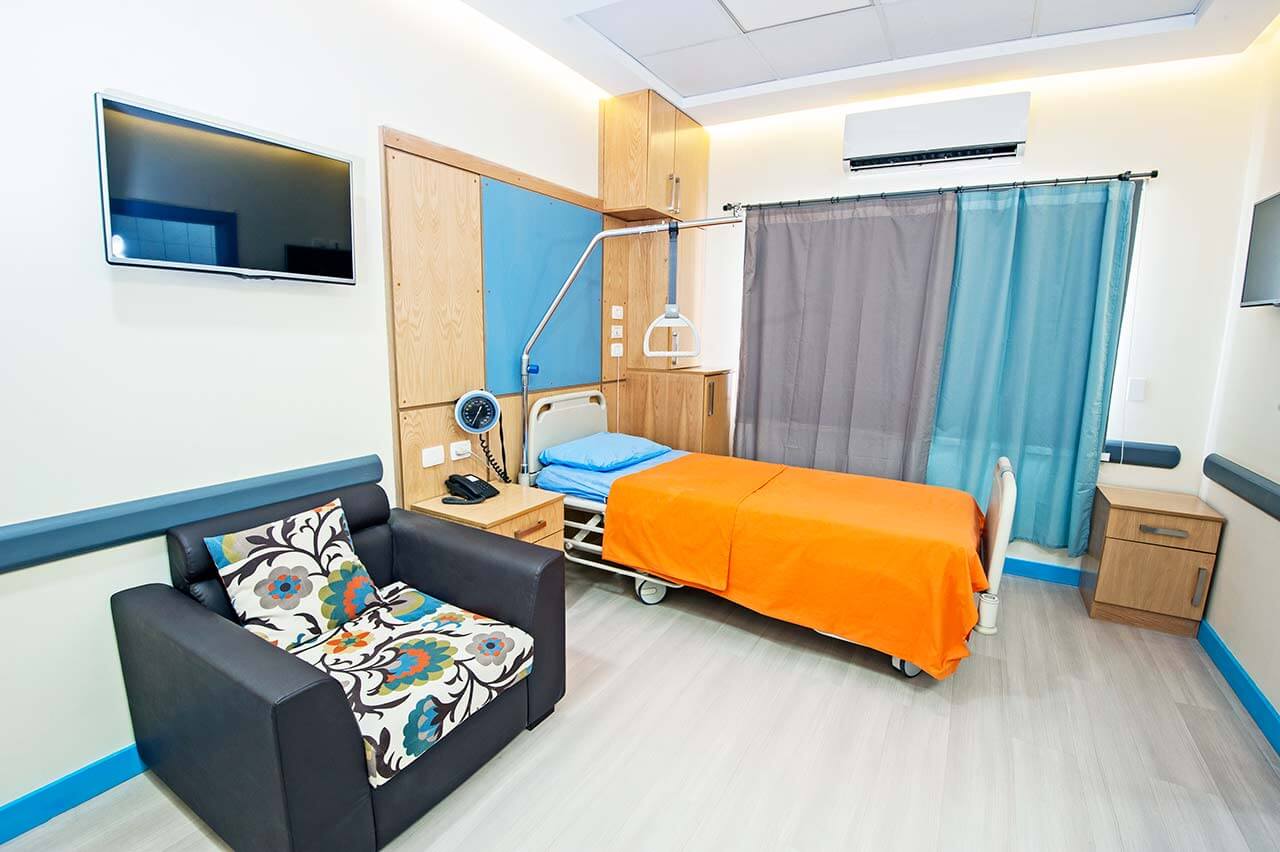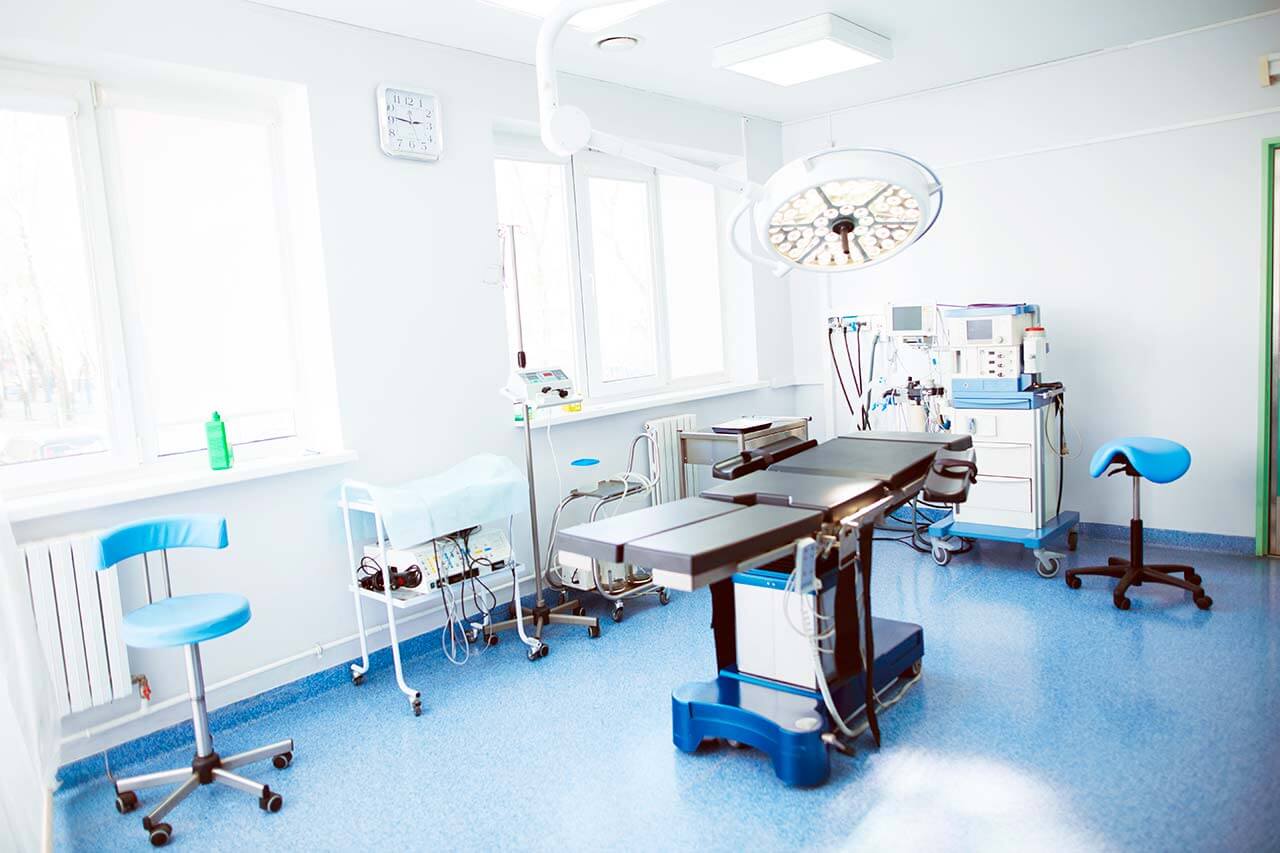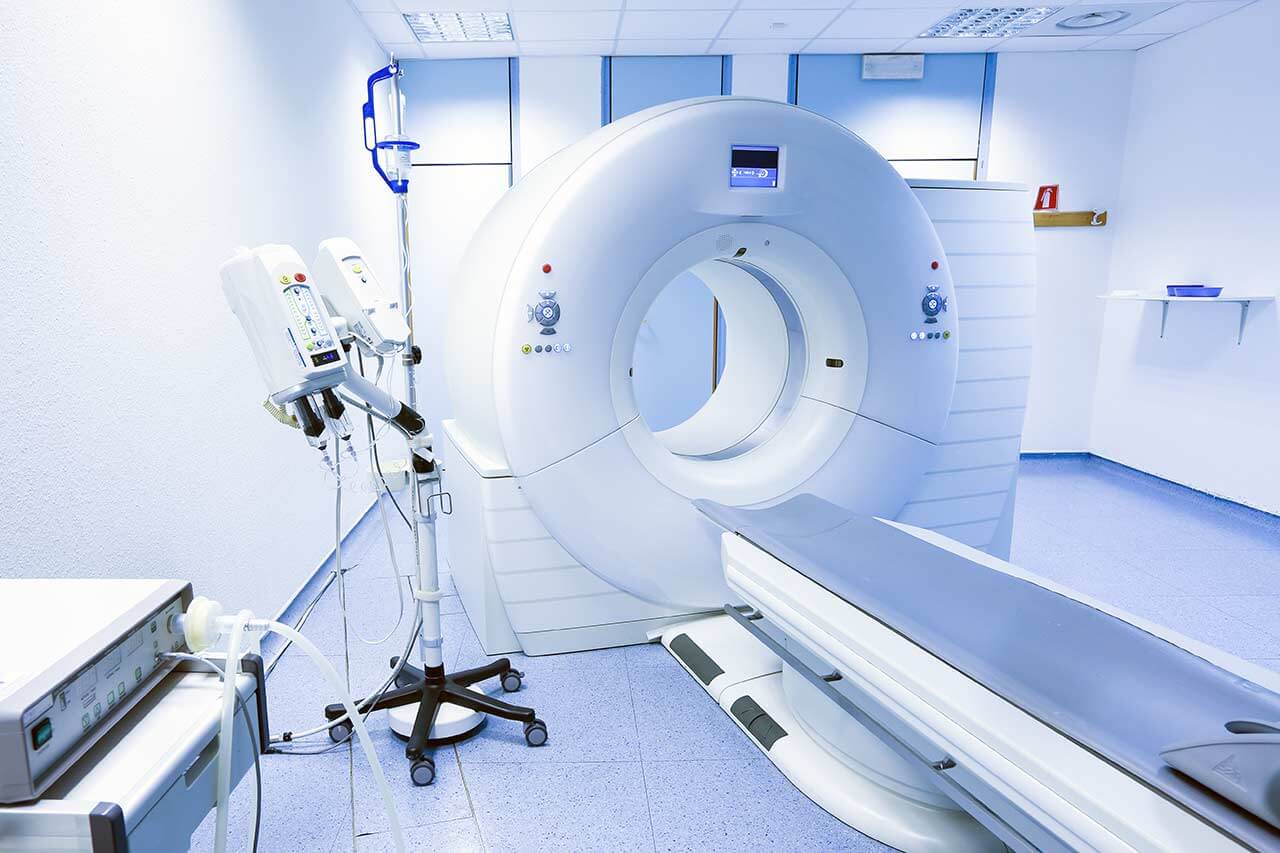
The program includes:
- Initial presentation in the clinic
- clinical history taking
- physical examination
- review of medical records
- laboratory tests:
- complete blood count
- biochemical analysis of blood
- indicators of inflammation (CRP, ESR)
- indicators of blood coagulation
- otorhinolaryngological examination
- x-ray/ ultrasound/ sialography
- nursing services
- consultation of related specialists
- consultation by chief physician and all leading experts
- development of individual treatment plan
- written statement
Required documents
- Medical records
- US scan (if available)
- Sialography (if available)
Service
You may also book:
 BookingHealth Price from:
BookingHealth Price from:
About the department
The Department of Adult and Pediatric Otolaryngology at the Municipal Hospital Karlsruhe provides the full range of medical services in this field and specializes in treating ENT diseases. The medical facility admits patients of all age groups, including children. The department demonstrates excellent results in the paranasal sinus, middle ear and laryngeal microsurgery, major surgery for head and neck tumor resection, facial plastic surgery, and in diagnosing hearing and speech disorders in children. Since 2013, the department has been successfully performing cochlear implantation operations for severe forms of hearing loss. Surgical treatment is performed using low-traumatic minimally invasive techniques and endoscopic techniques. Due to the presence of advanced computer equipment and navigation systems, the department ensures the high safety of ENT operations. The medical facility is focused on individualized medical care that meets international standards. In addition to inpatient treatment, doctors also offer many outpatient medical services. The department is headed by Prof. Dr. med. Werner Heppt.
The department offers many high-precision diagnostic methods. These include flexible endoscopy, state-of-the-art hearing and balance testing, including tinnitus testing and vascular Doppler scanning, smell and taste perception testing, nasal airway resistance measurement, nasal blood flow analysis, facial EMG, allergy testing, aspirin provocation testing, and digital volume tomography. These diagnostic procedures are indispensable in selecting hearing aids, tinnitus and dizziness treatment, immunotherapy in patients with allergies, nasal polyp prevention, and planning surgery using 3D facial reconstruction and photomodeling, for example, for the nose and ear reshaping.
Should surgical treatment be required, minimally invasive procedures are mostly performed under endoscopic and microscopic guidance. In this case, intraoperative monitoring is used (during operations on the facial nerve and vocal cords), laser technologies and navigation systems. These advanced techniques provide patients with maximum accuracy and reliability of surgical treatment.
Since 2013, the department has been performing cochlear implantation, allowing patients with severe sensorineural hearing loss to restore their hearing. The Head Physician of the department, Prof. Werner Heppt, is responsible for cochlear implantation. The specialist gained invaluable experience in this medical field while working in the Department of Otolaryngology at the Hannover Medical School. In most cases, cochlear implantation is indicated for newborns, the elderly, and middle-aged patients with severe hearing loss. Of particular interest is cochlear implantation in newborns. Young patients are strongly recommended to have an implant placed before the age of 1 year. Preliminary diagnostics, which determine the need for surgery, are carried out at the age of 6 months. The main diagnostic methods include a hearing test by measuring auditory evoked potentials of the brain, computed tomography and magnetic resonance imaging of the hearing organs. The department's doctors also recommend adult patients not to delay the operation. The surgery is performed under general anesthesia and lasts about 2 hours. After the operation, patients remain in the hospital, and a hospital stay usually does not exceed 5 days. About 4 weeks after discharge, a patient visits the department to adjust the speech processor of the implant, after which it takes some more time (usually 4-8 weeks) for the implant to fully adapt and, accordingly, fully restore hearing.
The department is part of the Cancer Center Karlsruhe. It provides interdisciplinary treatment of head and neck tumors: pharyngeal, laryngeal, tongue and oral cavity, salivary gland, thyroid gland cancers, and malignant neoplasms on the neck, nose, paranasal sinuses, and ear. The department's specialists have successful experience in treating rare tumors of the skull base and neck. Treatment regimens are developed during tumor boards with the participation of surgeons, oncologists, radiation therapists and other specialists. Each patient receives an individual treatment plan adapted to their clinical case. As a rule, the first-line therapy is surgical resection of the neoplasm. In most cases, the department's surgeons use sparing minimally invasive techniques, while taking into account not only the effectiveness of the intervention, but also the preservation of the functionality and aesthetics of the operated site. Whenever required, the defects in the area of tumor resection can be closed using free flaps, microvascular techniques, etc. Surgical tumor removal is usually followed by chemotherapy and/or radiation therapy.
Many patients with nose and paranasal diseases seek medical attention from the department. The most common pathologies include acute and chronic inflammatory processes, malformations, benign and malignant neoplasms, consequences of traumatic injuries, etc. If it is necessary to perform surgical treatment, preference is always given to endonasal interventions, which are highly effective and safe.
The department also offers the full range of diagnostic services, conservative and surgical treatment of ENT diseases in children. Such pathologies as otitis media, effusion in the tympanic cavity, tonsillitis, ENT malformations, and enlarged pharyngeal and palatine tonsils are quite common in the clinical practice of pediatric otolaryngologists. The department also has a specialized Section of Phoniatrics and Pedaudiology, which treats voice and speech disorders, and all forms of hearing loss in children. Most surgical interventions in children are performed on an outpatient basis, without hospitalization.
The department's main clinical activities include:
- Diagnostics and treatment of malignant head and neck tumors
- Cochlear implantation in adults and children
- Diagnostics and treatment of nose and paranasal sinus diseases
- Diagnostics and treatment of allergic reactions
- Diagnostic examinations
- Prick tests
- Serology tests (in particular, the determination of allergen-specific antibodies in the blood)
- Nasal provocation tests
- Nasal secretion cytology
- Smell and taste perception testing
- Airflow assessment (rhinomanometry)
- Pulmonary function testing (spirometry)
- Therapeutic methods
- Prescribing symptom-specific drugs
- Specific immunotherapy (in the form of injections and pills)
- Diagnostic examinations
- Diagnostics and treatment of facial paralysis
- Aesthetic facial plastic surgery
- Rhinoplasty (nose reshaping)
- Lower and upper eyelid plastic surgery
- Thread lift
- Facelift
- Ear reshaping
- Ear reconstruction
- Resection of facial, ear, and neck tumors
- Scar revision
- Reconstruction of the facial area in the case of defects due to accidents
- Diagnostics and treatment of otolaryngologic diseases in children
- Inflammatory processes of the middle ear
- Effusion in the tympanic cavity
- Tonsillitis
- ENT malformations
- Hearing, voice and speech disorders in children
- Diagnostics and treatment of sleep-related breathing disorders
- Insomnia
- Excessive sleepiness and daytime fatigue (hypersomnia and narcolepsy)
- Snoring and other sleep-related breathing disorders (obstructive sleep apnea, obstructive snoring, and Cheyne-Stokes respiration)
- Parasomnias (for example, sleepwalking)
- Restless leg syndrome
- Sleep disturbances due to changing time zones or working in shifts
- Sleep disturbances due to physical or mental disorders such as psychosis, depression, Parkinson's disease, dementia, and chronic lung diseases
- Pedaudiology and phoniatry
- Care for hearing loss in children
- Care for speech disorders in children
- Care for hearing loss
- Other diagnostic and therapeutic options
Curriculum vitae
Higher Education and Professional Career
- Since 1996 Head of the Department of Adult and Pediatric Otolaryngology at the Municipal Hospital Karlsruhe.
- Since 2008 Otolaryngological Private Practice in Baden-Baden.
- 1985 - 1993 Professional training, Department of Otolaryngology at the University Hospital Heidelberg.
- 1993 - 1999 Professional training, Hannover Medical School.
- 1999 Professorship, Hannover Medical School.
- 1993 Habilitation (Rhinology), University of Heidelberg.
- 1986 Doctoral thesis defense (Oncology), University of Wuerzburg.
- 1979 - 1985 Study of Human Medicine in Wuerzburg.
Scholarships
- Bavarian Scholarship for Gifted Students.
- Scholarship of the German Academic Exchange Service.
Qualifications
- 1988, 1994, 1999 Facial Plastic Surgery, Switzerland and the USA.
- 1993 Additional qualification in Plastic Surgery.
- 1991 Additional qualifications in Treatment of Voice and Speech Disorders.
- 1990, 1996 Additional qualification in Allergology and Environmental Medicine.
- 1989 Board certification in Otolaryngology.
Memberships in Professional Societies
- Founding Member and Board Member of the Expert Board of German Otolaryngology Surgeons.
- Founding Member and Treasurer of the Rhinoplasty Society of Europe.
- Chairman of the Äskulap e.V. Baden-Baden.
- Board Member of the European Academy of Facial Plastic Surgery.
Photo of the doctor: (c) Städtische Klinikum Karlsruhe
About hospital
The Municipal Hospital Karlsruhe is a modern maximum care medical facility, which combines a long tradition and the advanced achievements of modern medicine. The hospital operates on the basis of the University of Freiburg, so scientific innovations in the field of diagnostics and treatment are continuously introduced into practice here. The hospital presents almost all areas of modern medicine, including many medical services for young patients.
A highly qualified and experienced team of more than 4,500 employees provides impeccable medical care. The medical facility has 1,571 beds for the hospitalization of its patients. The hospital admits more than 63,000 inpatients and about 186,000 outpatients annually. A large number of patients wishing to receive medical care in the hospital speak for themselves and are a confirmation of the exceptional service, as well as the effectiveness of the treatment provided.
The quality management system of the hospital's medical care is certified in accordance with the DIN EN ISO 9001 standards. Since 2016, the hospital has implemented a regular quality control in compliance with the strict standards of the Initiative Quality Medicine (IQM). In addition, almost all departments of the hospital have numerous certificates in their areas of specialization, including certificates from the German Cancer Society (DKG), the German Society for General and Visceral Surgery (DGAV), the German Cardiac Society (DGK), the German Diabetes Society (DDG), the German Society of Nephrology (DGN), the German Trauma Society (DGU), etc.
The main value of the hospital's staff is the health and satisfaction of their patients, so a respect and a humane attitude towards each patient remain priorities. The doctors and nursing staff support each patient in every possible way on their path to recovery. The specialists also strive to perform the most sparing, but at the same time the most effective and safe treatment.
Photo: (с) depositphotos
Accommodation in hospital
Patients rooms
The patients of the Municipal Hospital Karlsruhe live in cozy patient rooms with everything necessary for a comfortable stay. Standard patient room furnishing includes an automatically adjustable bed, a bedside table, a TV, and a telephone. The patient rooms have Wi-Fi. Each patient room also has an ensuite bathroom with a shower and a toilet.
The patient rooms in the pediatric departments are specially designed for children, so that young patients feel at home. Children can live in their patient room with one of their parents. There are also special playrooms designed for children.
Meals and Menus
The patients of the hospital are offered tasty and varied three meals a day: breakfast, lunch and dinner. The menu also features dietary meals. The kitchen staff will gladly accept all the individual wishes of patients.
The hospital also has a cozy cafe where one can have a tasty snack, drink tea, coffee and soft drinks.
Further details
Standard rooms include:
Religion
The hospital has two chapels that regularly host Protestant, Catholic, and Ecumenical worship services. A patient can watch the broadcast of the worship on TV channels in his own room, if desired.
Accompanying person
Your accompanying person may stay with you in your patient room or at the hotel of your choice during the inpatient program.
Hotel
You may stay at the hotel of your choice during the outpatient program. Our managers will support you for selecting the best option.





